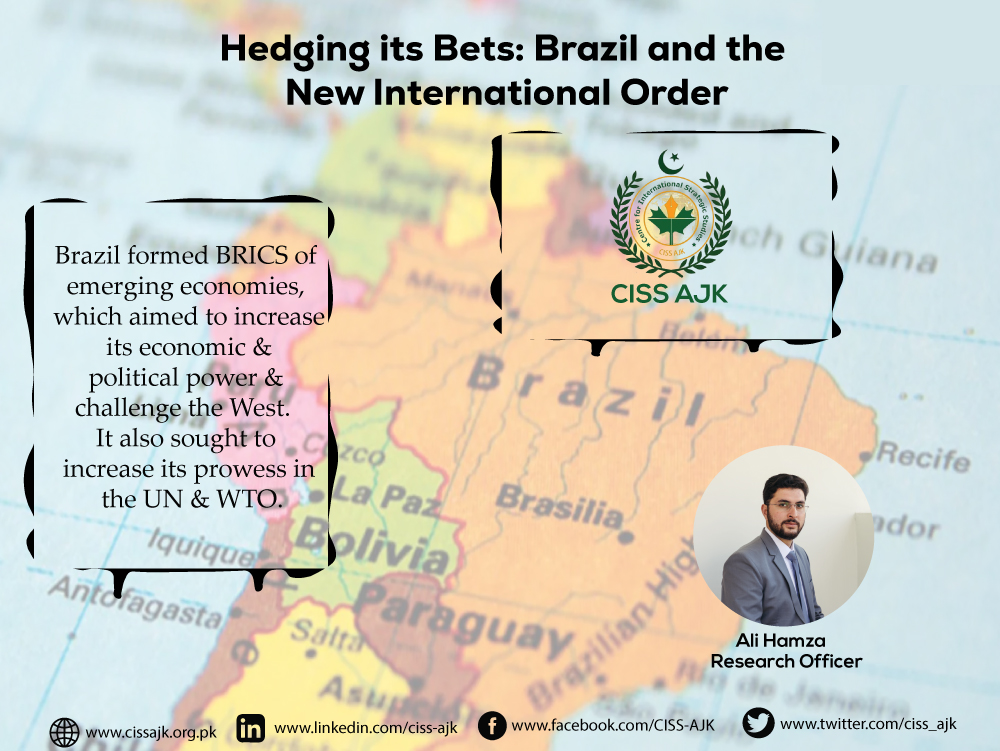744
As the US-China rivalry unfolded, the other international actors, allies of both powers and otherwise, have positioned themselves very differently from the old Cold War-style alliances. This new trend in international relations is suggestive of the fact that the world will not necessarily be divided into blocs as it was during the Cold War. The question then arises what will be the outlook of the future world? It can be observed that as the U-China rivalry intensifies, other important global actors have preferred to gain the maximum out of this scenario and have not thrown themselves on the side of either power. It is evident that countries like India, Brazil, and even European countries are trying to hedge their bets and exploit the US-China rivalry for their benefit. The recent assertion of independence in foreign policy by Saudi Arabia also corroborates this argument.


The trajectory of international politics suggests that the New World Order will not be simply led by two great powers, but other important international actors will certainly have a defining role.Brazil is a quintessential case of a state hedging its bets in the new international dynamics and trying to be neutral in the global power competition. It has even claimed to act as a mediator between China and the US. As Brazilian president Lula da Silva ascends to the highest office again, much is expected from Brazil in the arena of international relations. Lula has been historically a proponent of Brazil’s enhanced role in the world. Brazil’s foreign policy during Lula da Silva’s presidency, from 2003 to 2010, was characterized by active diplomacy, multilateralism, and non-intervention. Lula established strategic alliances with countries like China and Argentina, raised Brazil’s profile as a global leader in addressing the climate crisis, and promoted regional integration in Latin America. Lula aimed to strengthen ties with countries in the developing world, namely those in Africa and South America. He sought to establish a more independent foreign policy that was not overly reliant on the United States. Under Lula’s leadership, Brazil formed a bloc with other emerging economies known as the BRICS countries (Brazil, Russia, India, China, and South Africa). This alliance aimed to increase the economic and political power of these countries and challenge the dominance of the Western powers. Brazil also sought to increase its role in multilateral organizations such as the United Nations and the World Trade Organization. However, under Lula’s protégée Dilma Rousseff and her successor Michel Temer, Brazil’s foreign policy suffered. Bolsonaro’s presidency saw Brazil abandon its position as a lead actor in addressing the climate crisis. Lula has pledged to restore Brazil’s global leadership role. Brazil’s foreign policy under President Lula da Silva is hyperactive and ambitious. Lula has made trips to China and the United States to maintain a neutral foreign policy stance and pursue grand plans, including a “peace club.” Brazil will reinstitute tourist visa requirements for citizens of the U.S. and three other nations. The international monetary fund projects that Brazil will continue to pursue its foreign policy and Lula is drawing on Brazilian traditions. China is ready to deepen political cooperation with Brazil. There seems to be a concerted effort by Brazil’s foreign policy establishment to shift the country’s foreign policy towards neutrality. One key aspect of Lula’s foreign policy is the pursuit of neutrality, as demonstrated by the decision to reinstate tourist visa requirements for citizens of the United States and three other nations. This move is seen as a response to the increasingly protectionist and isolationist policies of the Trump administration, and as a signal of Brazil’s commitment to maintaining its own independence and sovereignty. At the same time, Lula is drawing on Brazilian traditions in his foreign policy approach, particularly the country’s historical commitment to multilateralism and diplomacy. This is reflected in Brazil’s increased engagement with regional and global organizations, including the Union of South American Nations (UNASUR) and the Community of Latin American and Caribbean States (CELAC), as well as its support for a range of peacekeeping and humanitarian initiatives.
China is also a key partner in Brazil’s foreign policy under Lula, with the two countries deepening their political cooperation and working together on a range of economic and strategic initiatives.This partnership reflects Brazil’s growing recognition of the importance of the Asia-Pacific region in global affairs, as well as its desire to diversify its partnerships and reduce its dependence on traditional Western allies. Lula’s stance on the Ukraine War is also quite innovative and has irritated the Western supporters of Ukraine. Lula has angered NATO nations by suggesting they are prolonging the Ukraine conflict by supplying arms to Kyiv and proposing that, to achieve peace, Russia might surrender some of the territories it controls in Ukraine but retain the occupied Crimean Peninsula, a prospect dismissed by Ukrainian President Volodymyr Zelensky. However, Russia is more comfortable with Lula’s proposal. According to U.S. secrets leaked online through the Discord messaging platform, officials at Russia’s Ministry of Foreign Affairs supported Lula’s plan, saying it would counteract the West’s “aggressor-victim” narrative about Ukraine. Shortly after returning from China, Lula hosted Russia’s foreign minister in Brasília. Brazil’s foreign policy behavior in today’s world is not a single case, but it is suggestive of how the emerging regional and international powers intend to conduct international relations. It would be unfounded to expect the world to be simply divided into two blocs: the American bloc and the Chinese bloc. Instead, the trends suggest that important international players other than these two great powers will also assert their strengths in all areas of international politics. Brazil has very rightly exhibited this new trend in international relations.

The Author is a Research Officer at the Centre for International Strategic Studies AJK. His areas of interest are Strategic Transitions and Realignments. He Tweets @alihamza_alaf



